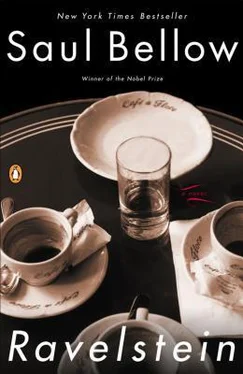For some reason Ravelstein and I were talking about them at the Cafй de Flore. On especially enjoyable days I suffer an early afternoon drop-fine weather makes it all the worse. The gloss the sun puts on the surroundings-the triumph of life, so to speak, the flourishing of everything makes me despair. I'll never be able to keep up with all the massed hours of life-triumphant. I had never spoken of this to Ravelstein but he probably sensed it. At times he seemed to be intervening on my behalf.
"Glyph loved the Pont Royal-it was his favorite hotel. Very close by," Ravelstein said. "And I'll tell you-when Mrs. Glyph died, Glyph came to Paris to grieve for her. He brought her papers along. His idea was to publish a collection of her essays. And he sent for Rakhmiel Kogon to help him-Rakhmiel was in Oxford."
"Why did Rakhmiel come?"
"He owed the old man. From way back. Glyph had saved Rakhmiel from being thrown out on his ear. He protected him-gave him sanctuary. This was before Rakhmiel became what academic fuckheads call 'a towering figure.' He came to Paris, anyway, and was also at the Pont Royal, though not in a suite. And every morning he reported to work on Maria Glyph's papers. Every morning Glyph would say, 'I have a cold, and Maria would not have wanted me to work today.' Or else, 'I must have my hair cut. Maria would say I am past due.' Or he would make an appointment with a Rochefoucauld or with a Bourbon-Sixte, while Rakhmiel organized her notes and read her crazy essays. But he was all the time drawn back to her journal. Because he was often mentioned there: _'Again that frightful little Jew, R. Kogon.'__ Or, _'I do my best to tolerate Herbert's repulsive protйgй Kogon, who gets Jewisher and viler and more unbearable by the day-with that brassy tomcat Jewface…__'"
"Kogon told you this himself?" I said.
"You bet he did. He couldn't help but be amused. He said she was such a Verdurin-a relentless social climber. When they're cultivated, such people have something more to exclude Jews from."
"But no serious person could take Mrs. Glyph seriously," I said.
"Did you know her, Chick?"
"I turned up just after she died. Glyph, a good man, unusually generous, would say 'my late wife' and then, for laughs, he'd add that she never was punctual. The second was a charmer-some people choose better as they go along. She turned out to be strong, generous, and clever. Once he invited me to dinner and he asked on the phone in his formal French style whether I objected to _'gens de couleur.'__ The guest was a gorgeous woman from Martinique-the wife of some famous art historian. Was it _the__ Rewald who wrote the book on Cйzanne?"
"You've always been lucky. You seldom make the most of your luck," said Ravelstein.
I was used to this. Ravelstein believed that I was gifted and bright but uneducated, naive and passive-inward. He said that when I was in the right company I was an inspired conversationalist and he told the students that there was no important subject I hadn't thought about.-Yes, but what had I done about all these big topics?
By following my suggestion Ravelstein had become very rich. And Rosamund after last night's celebration had said to me, "It was meant to be a great occasion. All the thanks and affection in Abe went into the Lucas-Carton symposium-dining, drink, and conversation Athenian-style." She had been one of Ravelstein's learned groupies. She was good at Greek. To study with Ravelstein you had to read your Xenophon, Thucydides, and Plato in Greek.
While I laughed at the way she described her teacher, I agreed.
She was unlike most other observant persons in that she also thought clearly. This was one of Rosamund's talents. But she also loved Ravelstein. She was one of his great admirers.
Abe went for his third _espresso serrй__ when the waiter set it down; Ravelstein's big, unskillful hand gripped the little cup as he carried it to his mouth. I would have given big odds on the outcome if a bet had been offered. Brown stains appeared on the lapel of his new coat. It was unpreventable-a fatality. He was still drinking the espresso; his head was far back. I kept my mouth shut, turning away from the large brown blot on the Lanvin coat. Another sort of man might have sensed at once that something had happened-someone, perhaps, who took money more seriously and who would feel somehow the responsibility involved in the wearing of a $4,500 garment. Ravelstein's neckties from Hermes or Ermenegildo Zegna were dotted with cigarette burns. I tried to interest him in bow ties. I said they would be protected under his chin. He saw the point, but he wouldn't buy ready-mades: He had never learned to knot a "papillon" (as he called it). "My fingers are too unsteady," he observed.
"Ah, well," he said, when he at last saw that he had soiled his Lanvin lapel. "I've fucked up again."
I didn't laugh at his remark.
A decision had to be made at this point. The coffee spill was funny, it was pure Ravelstein. He himself had just said so. But I did not treat it as a comic incident. I suggested in a somewhat stifled manner that the stains might be removed. "The valet service at the Crillon probably can do it."
"You think so?"
"If they can't, it can't be done anywhere."
You had to be something of a specialist to follow the movements of his mind. You had to distinguish between what people had been taught that they ought to do and what they deeply desired to do. According to certain thinkers, all men were enemies; they feared and hated one another. There was a war of all against all, in the state of nature. Sartre has told us in one of his plays that hell is "the others"-Abe detested Sartre, by the way, and despised his ideas. Philosophy is not my trade. True, I had studied Machiavelli and Hobbes at school, and I suppose that I could bluff my way through a quiz show. I was, however, a quick study, and I had learned quite a lot from Ravelstein because I was devoted to him. I "cherished" him, as one of my acquaintances had taught me to say.
Obviously, my purpose in mentioning the Crillon's valet service was to comfort Abe for spilling the Flore's strongest coffee on his brand-new jacket. But Abe didn't want me to console him for being what he was. He would have thought better of me for laughing at his sputtering reckless slobbering, his gauche eager tremors. He liked broad comedy, old vaudeville routines, wounding remarks, brashness, and raw fun. So he didn't think well of my weak, liberal, let's-make-it-all-better motive-my foolish kindness.
Abe took no stock in kindness. When students didn't meet his standards he said, "I was wrong about you. This is no place for you. I won't have you around." The feelings of the rejects didn't concern him. "Better for them if they hate me. It'll sharpen their minds. There's too much therapeutic bullshit, altogether."
He said that all kinds of creatures imposed on me and wasted my time. "Read any good book about Abe Lincoln," he advised me, "and see how people bugged him during the Civil War about jobs, about war contracts, franchises, consular appointments, and mad military ideas. As president of all the people he thought he was obliged to talk to all these parasites, creeps, and promoters. All the while he was standing in a river of blood. War measures made him a tyrant-he had to cancel the habeas corpus writ, you know. There was a higher thee-ah thee-ah need. He had to keep Maryland from joining the Confederacy."
Of course my needs were different from Ravelstein's. In my trade you have to make more allowances, taking all sorts of ambiguities into account-to avoid hardedged judgments. All this refraining may resemble naivetй. But it isn't quite that. In art you become familiar with due process. You can't simply write people off or send them to hell.
On the other hand, as Ravelstein saw, I was willing to take risks-abnormally willing. "Humongous risks " was how he put it. "It's hard, all-in-all, to find a less prudent person than you, Chick. When I consider your life, I begin to be tempted to believe in a _fatum__. You have a _fatum__. You really are one for sticking your neck out. And maybe the thee-ah neck is not all that sticks out. But what I want to say is that your guidance system is extremely defective."
Читать дальше












